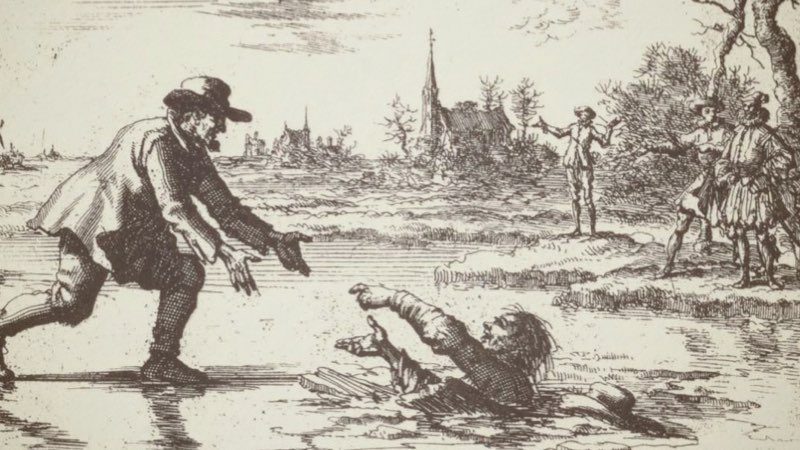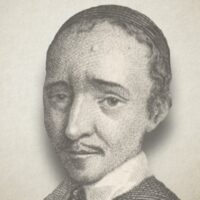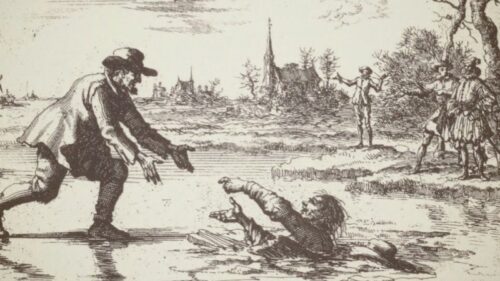
13. Of the False Church’s Origin
Of the Ungodly and False Church, which is the Opposite of the Church of God, and the Origin, Progress and Succession of the Same through All Times
Where God builds a temple, says the old proverb, there the devil builds another in opposition. This has been apparent ever since the beginning of the world. For at the same time that Abel became a martyr of God, and, therefore, a good leader of the children of God, Cain made himself a murderer, and became a leader of the children of Satan, who belong to the ungodly and false church, as members of one body. Gen. 4:8. He was followed by Lamech, one of Cain’s descendants, who slew a young man, and afterwards spoke of it to his wives Addah and Zillah, in a boasting and presumptuous manner. Gen. 4:23. The people of the first world universally, with the exception of eight, followed in the footsteps of Lamech in wickedness; they exercised tyranny, violence, and oppression, and would not be governed by the Spirit of God. Gen. 6:3, 4. The Sodomites followed in the same course, vexing with their unbecoming walk the righteous soul of Lot from day to day. Gen. 19; II Pet. 2 :8. These were succeeded by the Egyptians, who imposed grievous and insupportable burdens upon the people of God, and finally sought their lives, yea pursued them even into the sea. Compare Ex. 1:11 with Ex. 14:9,10,23. After these were the seven nations, or inhabitants, of the land of Palestine, who were greater and mightier than the children of Israel, but were banished by God on account of their wickedness; namely the Canaanites, Hittites, Girgashites, Amorites, Perizzites, Hivites, Jebusites, etc. Deut. 7:1,2. After these manifested themselves the Amorites, Moabites, Midianites, Philistines, and many others, who disturbed, oppressed, and harassed in manifold ways the people of God, which was dwelling in quiet. See throughout in the book of the Judges, the books of Samuel, the Kings, and Chronicles. The Chaldeans, Assyrians, and the inhabitants of the land of Babylon, followed those already mentioned; they carried the church of God away into foreign lands, burned the house of God, and laid waste the city of Jerusalem, which God had chosen above all cities of the whole earth. II Kings 1-17; Jer. 52:1-20; Lam. 1:1-5. The mighty cities, Tyre and Sidon, in Phoenicia, and afterwards, Chorazin, Bethsaida, Capernaum, which defied the world itself with their greatness, and cast the threatenings of God to the wind, lifted up their heads after the last mentioned, but to their own destruction. Compare Isa. 23:4, 5; Ezek. 27 and 28 throughout, with Matt. 11:20-23. All these who have been mentioned, from Cain on, succeeded one another in regular order, and may be considered as members of the church of Satan; since they have neither in generation, nor in faith, nor in worship, nor in manner of life, agreed with the church of God, but opposed it in every respect.
After the coming of Christ, many who had adopted the Christian religion and worship, apostatized, denying the faith, and thus becoming fellow members in the last mentioned, ungodly, and wicked congregation; as, for instance: Simon Magus, who by confession of faith, and baptism bad joined himself to the visible church of God, but fell from it, desiring to purchase the gift of the Holy Ghost with money, which, according to the apostle Peter, tended to his destruction, although he afterwards, as it appears, was again converted. Acts 8:13, 18-22. Hymenaeus and Alexander, who concerning faith made shipwreck, and were full of blasphemies, wherefore they were put away from the church by Paul, and delivered unto Satan. I Tim. 1:19, 20. Phygellus and Hermogenes, who with the greater number of those in Asia, were turned away from Paul, and, consequently, also from the doctrine of the Gospel which they had received. II Tim. 1:15. Hymenaeus (the second) and Philetus, who, having erred concerning the truth, pretended that the resurrection of the dead was past already; whereby they overthrew the faith of some. II Tim. 2:17,18. Demas, who forsook Paul, having loved the world. II Tim. 4:10. Alexander, the coppersmith, who did the apostle much evil, on account of which the church of Christ is admonished to beware of him. II Tim. 4:14,15. Many others, who, though they bore the name of members of the Christian church, did not stand by but forsook the oft mentioned servant of God, when he was to answer before the Emperor Nero in regard to the Evangelical doctrine; for which reason their names did no longer belong among the pious. See last mentioned chapter verse 16. After these followed many who in the days of John went out from the Church of Jesus Christ, and did the works of antichrist; wherefore they were called antichrists, being forerunners of the great antichrist who was to follow afterwards. See I John 2:18, 19. Besides these who arose already in the time of the apostles, and went out from the holy congregation of God, many others, who can not all be mentioned, followed in all ages and will follow to the last days. Of this the apostles prophesied when their departure was near at hand, and warned the believers of their coming. When Paul knew and was fully assured through the revelation of the Holy Ghost that all those among whom he had traveled preaching the Gospel would see his face no more, he thus addressed, on the island of Miletus, the elders of the church of Ephesus, who had come to him: I know, beloved brethren, that after my departing shall grievous wolves enter in among you, not sparing the flock. Also of your own selves shall men arise, speaking perverse things, to- draw away disciples after them. Therefore watch, and remember that by the space of three years I ceased not to warn every one night and day with tears. Acts 20:29-31. Afterwards when he was in the city of Laodicea, in Phrygia Pacatiana, he wrote in a certain letter to his beloved friend Timothy, concerning the apostasy which should be through some in the latter times, thus: “Now the Spirit speaketh expressly, that in the latter times, some shall depart from the faith, giving heed to seducing spirits, and doctrines of devils; speaking lies in hypocrisy; having their conscience seared with a hot iron; forbidding to marry, and commanding to abstain from meats.” I Tim. 4:1-3. Who these apostates were that, in many instances, have forbidden marriage and meats it is unnecessary to point out, since the truth of the matter is clear and manifest to almost everyone. But at the close of his life, when he was imprisoned at Rome the second time, and had already received his sentence of death, namely, to be executed with the sword, for the name of the Lord, he once more renewed the foregoing to his friend and spiritual son Timothy, in order that he might never forget it, but also put the church, where he was a teacher, in remembrance of it with these words: “This know also that in the last days perilous times shall come. For men shall be lovers of their own selves, covetous, boasters, proud, . . . having a form of godliness, but denying the power thereof.” II Tim. 3:1-5. Continually, he adds this declaration for further instruction: “The time will come when they” (namely, certain members of the Christian church) “will not endure sound doctrine; but after their own lusts shall heap to themselves teachers, having itching ears; and they shall turn away their ears from the truth, and shall be turned unto fables” (II Tim. 4:3,4). In like manner, Peter also, as his departure drew nigh, expressly prophesied to the chosen strangers scattered abroad: That, as there were, in times past, false prophets among the people (Israel), there should also be false teachers among (or out of) them, who should privily bring in pernicious heresies, even denying the Lord that bought them. II Pet. 2:1. It would require too much time to recount what also John says on this subject, not only in his epistles, but especially in his revelation; since he gives a description of the condition of both the church of Christ and of antichrist, from his time to the end of the world.
Thieleman J. Van Braght (1625-1664) was an Anabaptist who is best known for writing a history of the Christian witness throughout the centuries entitled “The Bloody Theater or Martyrs Mirror of the Defenseless Christians who baptized only upon confession of faith, and who suffered and died for the testimony of Jesus, their Saviour, from the time of Christ to the year A.D. 1660” (1660).
Thieleman J. Van Braght, Martyrs Mirror




